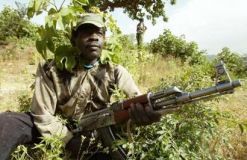Darfur peace talks faced with deadlock over security plan
ABUJA, Oct 26 (AFP) — Peace talks between the Sudanese government and rebels from the war torn region of Darfur broke after less than an hour on Wednesday, despite a promise from the administration to consider a power-sharing deal.

|
|
A member of the Sudanese Liberation Army (SLA) patrols around Dorsa village in west Darfur, October 10, 2004. |
Sudanese ministers said Darfur’s demands for autonomy and a greater share of the country’s oil revenues would be taken into account in a broader dialogue between political factions from the country’s other regions.
Nevertheless, with one rebel faction refusing to address a political settlement until agreement has been reached on demilitarising the conflict, African Union mediators were forced to adjourn the day’s session early.
The AU will now meet separately with rebel chiefs to hear their views on a proposed “security protocol”, in a bid to reach an agreement on demobilising rebel forces and disarming Darfur’s pro-government Arab militias.
“We are ready to undertake political reforms and restructure the armed forces and the police,” Sudan’s Minister of Humanitarian Affairs Mohammed Yusuf said.
“We are ready to call a conference of parties to discuss the political future on the basis of power-sharing among the regions,” he promised.
But the head of the government delegation, Agriculture Minister Majzoub al-Khalifa, added: “All these arrangements have to take cognisance of all the existing arrangements and agreements we have with all the other bodies.”
The rebel Justice and Equality Movement (JEM) and Sudan Liberation Movement (SLM) came to Abuja hoping to use international sympathy for the plight of Darfur’s 1.5 million displaced people to force concessions from the government.
They want to reach a deal on regional autonomy before they will agree to put down their arms and bring an end to their 20-month-old insurrection, which has triggered a conflict in which more than 70,000 civilians have lost their lives.
“The government may not be willing to share power because they control the centre,” said JEM political advisor Abdullahi Osman el-Ton.
“We have to push them to agree because we’ve been marginalised over the years. All the key positions are monopolised by people from specific regions. We want a fair and equitable distribution of power and resources,” he said.
“This is our position and we are going to push it to its logical conclusion,” he warned.
Meanwhile, a difference in tactics within the rebel camp complicated the mediator’s task further.
The JEM said they were ready to talk politics while the group’s military commanders thrashed out a separate security deal, but the SLM said they would take no part in further dialogue until such an agreement was signed.
Both rebel groups have said they will not demobilise, as demanded by the government, until a political solution is reached, and both have demanded that Khartoum’s proxy militia the Janjaweed be disarmed.
AU mediators were to meet with both groups later Wednesday.
Meanwhile, Nigeria announced that it would begin reinforcing its contingent in a AU truce-monitoring force in Sudan. The force is due to expand to be 3,250-strong with soldiers from up to six African countries.
Nigerian defence spokesman Colonel Ganiyu Adewale said that US transport planes would start ferrying the Nigerian soldiers to Sudan from Thursday.
